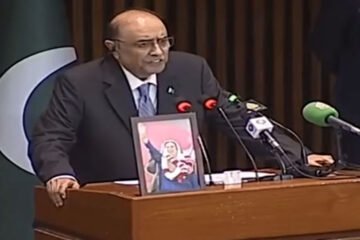Govt to file reference against Justice Seth, challenge Musharraf case verdict

ISLAMABAD, Dec 20(APP):The Federal Government on Thursday decided to file a reference in the Supreme Judicial Council (SJC) against the author judge of the verdict against former president Pervez Musharraf in the high treason case under Article 209 of the Constitution, besides challenging the judgment in the Supreme Court.
Flanked by the prime minister’s special assistants Dr Firdous Ashiq Awan and Shahzad Akbar, Minister for Law and Justice Dr Farogh Naseem told the media here that the laws relating to the high treason, including Article 6 of the High Treason (Punishment) Act, 1973, and The Criminal Law Amendment (Special Court) Act, 1976 did not permit any judge to pass such kind of observation that a person’s corpse should be dragged at a Chowk and then hanged there for three days, which Peshawar High Court Chief Justice Waqar Ahmed Seth had made in para 66 of the verdict.
“It is beyond my understanding that under which authority a judge can give such a despicable and unethical observation in a decision,” he remarked. It was not only a deviation from the Constitution, but also counter-productive for the people’s confidence in judiciary, he added.
He said former Chief Justice of Pakistan Naseem Hasan Shah had given a judgment in the past that the ‘public hanging’ was against the Constitution and Islam, and cited the “universal declaration of human rights in Islam” and Article 14 of the Constitution relating to the fundamental right of the dignity of a human being in that regard.
He said the government would plead in the SJC that Justice Waqar Ahmed Seth should be restrained from performing his constitutional duties, as he, after passing such an observation, had no authority to hold such an esteemed judicial position.
“I request senior judges of the Supreme and high courts to restrain him from carrying out any administrative and judicial duties as his observation shows that he is mentally ill and incompetent,” he added.
Special Assistant on Accountability and Interior Barrister Shahzad Akbar said the government had a serious concern over the mode and manner of the trial, and the way it was concluded in haste ignoring procedural and constitutional flaws.
The rushed manner, in which the case was wrapped up, negated the spirit of criminal jurisprudence, he said, adding the government was deliberating upon the reasons for the hasty conclusion of the case.
“Trial in absentia cannot be conducted and it has never happened in the history of Pakistan,” he remarked.
He said the Federal Government, and the Lahore and Islamabad high courts had pointed out that there were serious procedural and constitutional issues that needed to be rectified, but the same were totally ignored by the Special Court.
Shahzad Akbar said it was the responsibility of guardians of law to create harmony among the state organs but “unfortunately the author of para 66 committed a suicidal attack on his own institution”, which had embarrassed the whole nation.
It was totally in contravention to the country’s Constitution and the international laws, he added.
The decision had not only damaged the judiciary’s reputation, but also raised questions on its credibility as the Constitution mandated the judges to interpret the Constitution and implement the laws, he added.
He said two other judges of the bench, which handed over death sentence to Musharraf, gave their dissenting notes over para 66.
Special Assistant on Information and Broadcasting Dr Firdous Ashiq Awan said the government and the Pakistan Army were committed to counter both the internal and external enemies, who were hatching conspiracies to destabilize Pakistan.
Musharraf’s case: UN says it opposes death penalty









